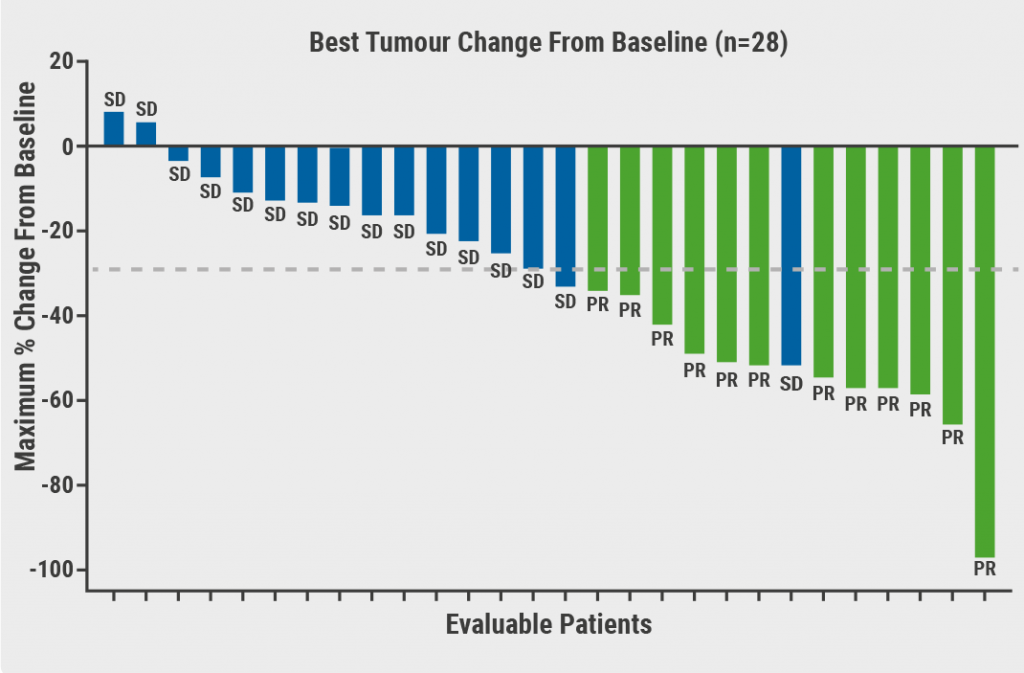KRASG12C mutations, which occur in 3–4% of CRC, act as oncogenic drivers and are a negative predictor of cetuximab efficacy. Adagrasib is a KRASG12C inhibitor that irreversibly and selectively binds KRASG12C, locking it in its inactive state. Durable inhibition of KRASG12C may be particularly important in CRC due to signalling pathways which create a susceptibility to feedback reactivation of KRAS. EGFR signalling is implicated in this reactivation, providing a rational co-targeting strategy for KRAS-mutant CRC.
KRYSTAL-1 (NCT03785249) is a multicohort phase 1/2 study evaluating adagrasib in patients with KRAS-mutant advanced solid tumours. CRC cohorts include adagrasib 600 mg twice daily monotherapy and adagrasib 600 mg twice daily plus cetuximab. Endpoints include safety, pharmacokinetics, and clinical activity. Dr Jared Weiss (University of North Carolina at Chapel Hill, NC, USA) presented the first results [1].
At data cut-off, 46 patients with CRC (50% female; median age 58 years; 3 median prior lines of therapy) had received adagrasib monotherapy (median follow-up 8.9 months). Among the 45 patients evaluable for clinical activity, the response rate was 22% (10/45, including 1 unconfirmed partial response who remains on study) and disease control rate was 87% (39/45). Median duration of response was 4.2 months; median PFS was 5.6 months. Treatment-related adverse events of any grade occurred in 91% and grade 3/4 events in 30% of patients, with no grade 5 events.
Conversely, 32 patients with CRC (53% female; median age 60 years; 3 median prior lines of therapy) were treated with adagrasib plus cetuximab (median follow-up 7 months). Among the 28 patients evaluable for clinical activity, the response rate was 43% (12/28, including 2 unconfirmed partial response who remain on study) and disease control rate was 100% (see Figure). Data are still unmature for duration of response and PFS. Treatment-related events of any grade occurred in 100% and grade 3/4 events in 16% of patients, with no grade 5 events.
Figure: Overall response of CRC patients on adagrasib plus cetuximab in KRYSTAL-1 [1]

“Adagrasib is well tolerated as monotherapy and combined with cetuximab and demonstrates promising clinical activity in heavily pretreated patients with KRASG12C-mutant CRC,” concluded Dr Weiss. The phase 3 KRYSTAL-10 trial (NCT04793958) currently evaluates adagrasib/cetuximab combination versus chemotherapy in the second-line setting in patients with KRASG12C-mutant CRC.
Similar data with another KRASG12C inhibitor, sotorasib, combined with panitumumab were also presented [2].
- Weiss J, et al. KRYSTAL-1: Adagrasib (MRTX849) as monotherapy or combined with cetuximab (Cetux) in patients (Pts) withcolorectal cancer (CRC) harboring a KRASG12C mutation. Abstract LBA6, ESMO Congress 2021, 16–21 September.
- Fakih M, et al. CodeBreaK 101 subprotocol H: Phase Ib study evaluating combination of sotorasib (Soto), a KRASG12C inhibitor, and panitumumab (PMab), an EGFR inhibitor, in advanced KRAS p.G12C-mutated colorectal cancer (CRC). Abstract 434P. ESMO Congress 2021, 16–21 September.
Copyright ©2021 Medicom Medical Publishers
Posted on
Previous Article
« Automated detection of microsatellite status on unstained samples in early colon cancer Next Article
Immune chemo-sensitisation looks promising in microsatellite-stable mCRC »
« Automated detection of microsatellite status on unstained samples in early colon cancer Next Article
Immune chemo-sensitisation looks promising in microsatellite-stable mCRC »
Table of Contents: ESMO 2021
Featured articles
Breast Cancer
Trastuzumab deruxtecan triples PFS
Novel conjugate meets primary endpoint
Longest survival benefit from first-line CDK4/6 inhibitor
Meta-analysis shows 6-months adjuvant trastuzumab is optimal
Double-positive results for triple-negative metastatic breast cancer
Survival after neoadjuvant therapy with trastuzumab-lapatinib plus chemotherapy
Postmenopausal breast cancer: extended letrozole reduces recurrence
Asian women also benefit from palbociclib plus letrozole
No PEARLs of survival with palbociclib plus endocrine therapy compared with capecitabine, but QoL better
Gastrointestinal Cancer
Neoadjuvant chemotherapy potential alternative to neoadjuvant chemoradiotherapy in LARC
Immune chemo-sensitisation looks promising in microsatellite-stable mCRC
Adagrasib shows promising clinical activity in heavily pretreated KRAS-mutated CRC
Automated detection of microsatellite status on unstained samples in early colon cancer
Consistent benefit of anti-PD-1 therapy for oesophageal and gastric cancer
HIPEC in gastric cancer with peritoneal metastases
ctDNA highly predictive in HER2-positive, advanced gastric or gastro-oesophageal junction cancer
Lung Cancer
Robust anticancer activity of trastuzumab deruxtecan in HER2-mutated NSCLC
Nivolumab/ipilimumab continues to provide survival benefit in unresectable MPM
Adjuvant atezolizumab lowers relapse rate in resected NSCLC
Three-year OS follow-up from CASPIAN trial
TCR clonality predicts pembrolizumab response in NSCLC
Melanoma
Adjuvant immunotherapy reduces risk of disease recurrence in stage II melanoma
IFN-γ signature predicts response to immunotherapy
Updated results of SECOMBIT trial
Combining T-VEC and pembrolizumab does not significantly improve survival in advanced, unresectable melanoma
Durable intracranial responses with nivolumab/ipilimumab
Genitourinary Cancer
TKI drug-free interval strategy not detrimental to conventional continuation strategy in RCC
Modified ipilimumab schedule reduces risk of grade 3/4 adverse events
Optimal neoadjuvant dose ipilimumab/nivolumab in stage III urothelial cancer
Better survival with neoadjuvant dose-dense MVAC regimen in MIBC
PARP inhibitor rechallenge improves PFS in ovarian cancer
Pembrolizumab prolongs survival in persistent, recurrent, or metastatic cervical cancer
Pembrolizumab has durable effect in previously treated MSI-H/dMMR advanced endometrial cancer
HRR mutational status is prognostic and predictive biomarker olaparib activity
Haematological Cancer
Mutational analyses are predictive in malignant lymphomas
Low numbers of M2 macrophages in tumour microenvironment associated with superior response to immunotherapy in Hodgkin lymphoma
COVID-19
Adequate response to SARS-CoV-2 vaccine in cancer patients
Cancer patients more likely to die from COVID-19 when hospital admittance is required
Third global survey of the ESMO Resilience Task Force
High COVID-19 mortality in Swiss cancer patients
Basic Science & Translational Research
Neutrophils negatively correlate with response to anti-PD-1 monotherapy in dMMR tumours
Tetraspecific ANKETs harnesses innate immunity in cancer therapies
Early ctDNA reduction in metastatic uveal melanoma correlates better with OS than RECIST response
Gut microbiota as a potential predictive biomarker
Related Articles
© 2024 Medicom Medical Publishers. All rights reserved. Terms and Conditions | Privacy Policy
HEAD OFFICE
Laarderhoogtweg 25
1101 EB Amsterdam
The Netherlands
T: +31 85 4012 560
E: publishers@medicom-publishers.com

